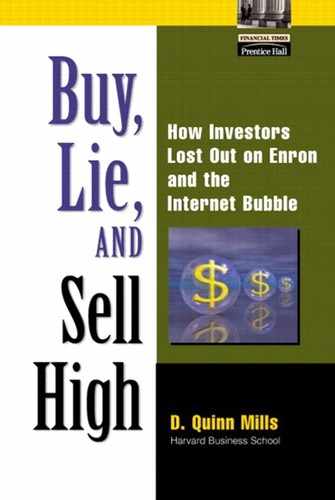Equity Analysts Promote the Company
Analysts at investment banks recommended Enron for purchase by investors and continued recommending it in many instances even as its stock crashed in value in the fall of 2001. In some instances, the recommendations to buy continued and even became stronger as the company's share price declined from the low $80s to less than a dollar. For example, Alliance Capital is reported to have bought Enron shares on behalf of the Florida State Pension Fund in large amounts as the share price declined from $22 to $9 and then to have sold the shares at $.28 each.[25]
In principle, the analyst's reasoning could have been justifiable. The financial markets do sometimes experience share price declines that are unmerited and which will be reversed. When share prices decline, therefore, sometimes real buying opportunities are created. When seeking a buying opportunity, analysts might recommend a stock whose price doesn't turn around, and thus the purchase causes losses for the investor. This is the ordinary operation of the market.
But when there is a conflict of interest, it's hard to accept that a mere mistake was made. That is, when an analyst for a bank recommends shares in a company to the public while the bank is receiving substantial fees from the company, or while the bank is dumping shares in the company that it owns itself, or while it is dumping shares owned by its preferred clients, then it is likely more than a neutral mistake. In effect, conflicts of interest undermine the credibility of the entire system of analyst recommendations.
